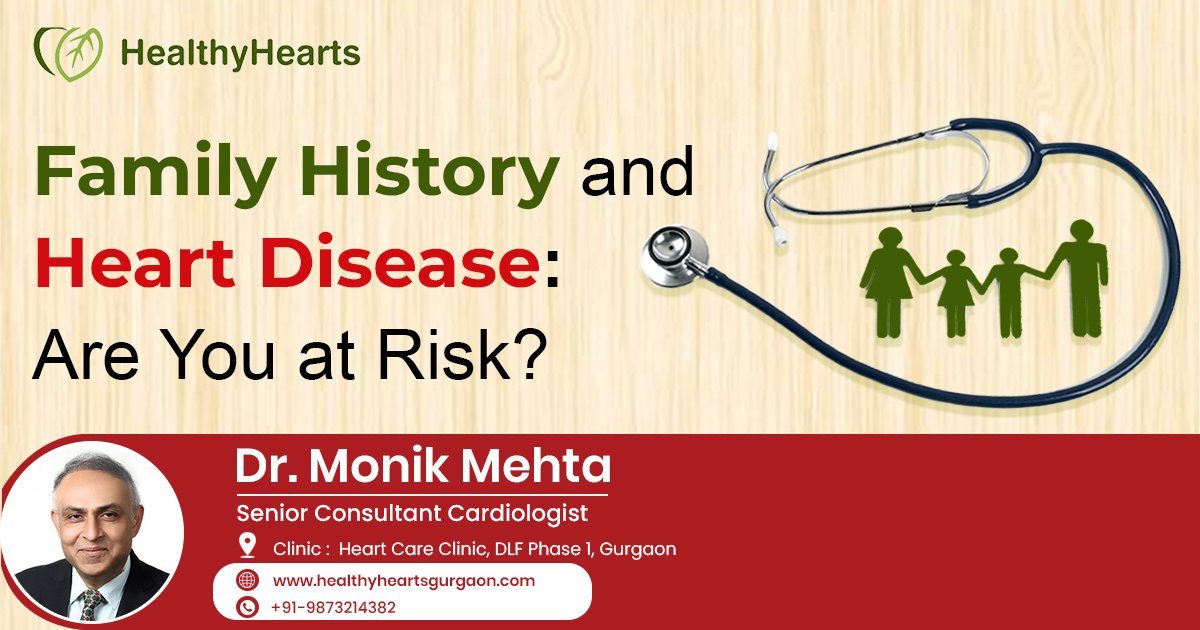Heart disease is a major health concern globally, and India is no exception. Many of us have heard stories from our elders about relatives who suffered from heart issues or other heart-related issues. These stories might make us wonder: “Am I at risk of heart attack because of my family history?” We can protect our heart health by taking preventive steps if we know the link between heart problems and relative history. Consulting the best heart doctor in gurgaon can provide insights and personalized advice.
What is Heart Disease?
Many different heart-related illnesses are included under the umbrella term “heart attack”. Heart failure, arrhythmias (irregular heartbeats), coronary artery disease, and other conditions are among them. The most common type is coronary artery disease, which happens when the blood vessels supplying blood to the heart become narrow or blocked. This can lead to chest pain (angina), heart issues, and other serious problems.
The Role of Family History
Bloodline history plays a significant role in determining one’s risk of heart problems. If your parents, siblings, or grandparents have had cardiovascular disease, you might be more likely to develop it too. A mix of common lifestyle variables and genetics probably accounts for this increased risk.
Genetic Factors
Genes are the basic units of heredity, passed down from parents to children. They can influence various aspects of our health, including the likelihood of developing cardiac disease. Certain genetic mutations can increase cholesterol levels, blood pressure, and other risk factors for coronary artery disease. For example, a condition called familial hyper cholesterolemia is caused by a genetic mutation that leads to very high cholesterol levels and early heart failure.
Early Warning Signs
Being aware of the early warning signs of heart problems can help you seek medical attention promptly. Some common symptoms include:
- Chest pain or discomfort
- Shortness of breath
- Palpitations or irregular heartbeats
- Fatigue or weakness
- Your legs, ankles, or feet are swelling.
If you find these sorts of symptoms are present, be sure to see your doctor right away. It causes you to consult your doctor immediately when you experience any of these symptoms, you might consider consulting Dr Monik Mehta, who provides the best heart care.
Shared Lifestyle Habits
Families often share lifestyle habits that can impact heart health. These include diet, physical activity levels, and smoking habits. For instance, if your family consumes a diet high in unhealthy fats and sugars, you might be more prone to developing cardiac disease. Similarly, if physical inactivity or smoking is common in your family, these habits can increase your risk.
Other Risk Factors
Although a significant influence, relatives history is not the sole one. Other cardiovascular disease risk factors include:
- Age: Risk increases with age.
- Gender: Men are generally at higher risk, but women’s risk increases after menopause.
- High Blood Pressure: The heart is strained more as a result.
- High Cholesterol: It may also eventually harden into plaque in the arteries.
- Diabetes: High blood sugar may damage blood vessels.
- Obesity: Excess weight increases the burden on the heart.
- Stress: Chronic stress can harm the heart.
- Unhealthy Diet: Diets high in saturated fats, trans fats, and cholesterol can increase risk.
- Lack of Physical Activity: Regular exercise is crucial for heart health.
Assessing Your Risk
The first step in assessing your risk is understanding your ancestry. To find out more about your family’s cardiac issues, have a conversation with them. Please record the age at when they were diagnosed, since early onset of coronary artery disease in close relatives may be a more accurate indicator of inherited risk.
Preventive Measures
While you can’t change your genes, you can adopt healthy habits to lower your risk of cardiac disease. The following are some of the tips you can achieve:
- Maintain a Healthy Diet: Consume a balanced diet rich in whole grains, fruits, vegetables, lean meats, and healthy fats. Limit the amount of sugar, salt, trans fats, and saturated fats you consume.
- Exercise Regularly: Every week, try to get in 150 or 75 minutes of vigorous or moderate-to-intense activity. Exercises that are good for the heart include cycling, swimming, walking, and running.
- Monitor Your Health: Monitor Your Blood Pressure, Cholesterol, and Blood Sugar. Regular checkups can also help identify issues while they are still small.
- Quit Smoking: Seek support to help you quit smoking. Smokers are more prone to get coronary artery disease.
- Manage Stress: Practice stress-relief techniques like yoga, meditation, deep breathing, or hobbies that you enjoy.
- Limit Alcohol: Drinking alcohol in moderation if you have high blood pressure. In older men, prolonged excessive drinking is linked to a higher risk of cardiovascular disease and is a risk factor for hypertension.
- Stay Informed: Educate yourself about cardiovascular disease and stay updated on new research and recommendations.
Conclusion
The mere fact that heart failure runs in your family does not guarantee that you will have it. Making good lifestyle choices and being aware of your risk of heart attack may help you significantly lower your risk. Remember, knowledge is power. Your heart now is the first step towards a better tomorrow. For personalized advice and treatment, consider consulting heart specialist doctor in gurgaon. Taking proactive steps towards a healthier lifestyle benefits your heart and enhances your overall well-being. Start making changes today for a healthier, happier tomorrow.

